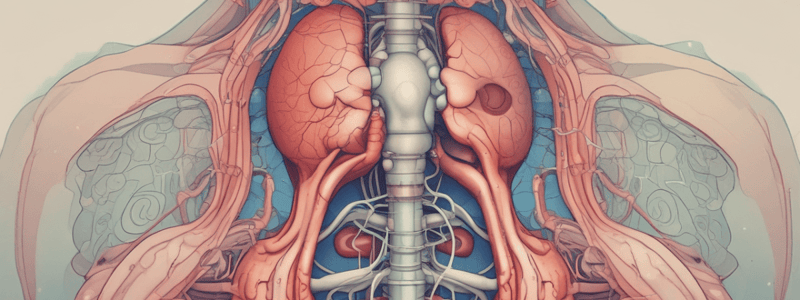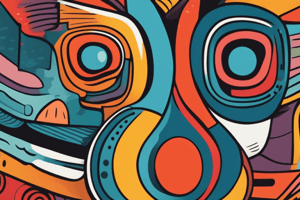Podcast
Questions and Answers
What percentage of the blood circulating in the body passes through the kidneys every minute?
What percentage of the blood circulating in the body passes through the kidneys every minute?
- 3/4
- 1/4 (correct)
- 1/2
- 1/8
What is the primary function of the kidneys in the body?
What is the primary function of the kidneys in the body?
- To control blood pressure through the Renin Angiotensin system
- To filter and remove waste products from the bloodstream (correct)
- To regulate electrolytes and water balance
- To synthesize vitamin D to its active form
What is the term for the process by which the kidneys regulate the amount of waste products in the blood?
What is the term for the process by which the kidneys regulate the amount of waste products in the blood?
- Acid-base control
- Urine formation
- Renal clearance (correct)
- Electrolyte regulation
What is the hormone system that helps the kidneys regulate blood pressure?
What is the hormone system that helps the kidneys regulate blood pressure?
What is the byproduct of the kidneys' function in filtering waste products from the bloodstream?
What is the byproduct of the kidneys' function in filtering waste products from the bloodstream?
What is the term for the process by which the kidneys regulate the amount of water in the body?
What is the term for the process by which the kidneys regulate the amount of water in the body?
What is the role of the renal pelvis in the kidney?
What is the role of the renal pelvis in the kidney?
Which of the following is NOT a function of the kidney?
Which of the following is NOT a function of the kidney?
What is the term for the process by which the kidneys regulate the amount of waste products in the urine?
What is the term for the process by which the kidneys regulate the amount of waste products in the urine?
What is the primary function of the nephrons in the kidney?
What is the primary function of the nephrons in the kidney?
What is the relationship between the kidneys and the ureters?
What is the relationship between the kidneys and the ureters?
What is the role of the cortex in the kidney?
What is the role of the cortex in the kidney?
What is a characteristic of oliguric acute renal failure?
What is a characteristic of oliguric acute renal failure?
Which type of acute renal failure is typically associated with a better prognosis?
Which type of acute renal failure is typically associated with a better prognosis?
What is the primary difference between oliguric and non-oliguric acute renal failure?
What is the primary difference between oliguric and non-oliguric acute renal failure?
Which of the following is a common complication of oliguric acute renal failure?
Which of the following is a common complication of oliguric acute renal failure?
How is urine output typically measured in oliguric acute renal failure?
How is urine output typically measured in oliguric acute renal failure?
What is the distinguishing feature of oliguric acute renal failure?
What is the distinguishing feature of oliguric acute renal failure?
What is the primary characteristic of urine output in oliguric acute renal failure?
What is the primary characteristic of urine output in oliguric acute renal failure?
What is the typical pattern of urine output in oliguric acute renal failure?
What is the typical pattern of urine output in oliguric acute renal failure?
How is oliguric acute renal failure characterized in terms of urine output?
How is oliguric acute renal failure characterized in terms of urine output?
What is the hallmark of oliguric acute renal failure in terms of urine output?
What is the hallmark of oliguric acute renal failure in terms of urine output?
Flashcards are hidden until you start studying
Study Notes
The Urinary System
- The urinary system consists of the kidneys, ureters, urinary bladder, and urethra.
- The kidneys are responsible for moving waste products from the bloodstream.
Functions of the Kidney
- The kidneys perform several functions, including:
- Urine formation
- Excretion of waste products (BUN/Creatine)
- Regulation of electrolytes
- Regulation of acid-base balance
- Control of water balance
- Assistance in blood pressure control (Renin Angiotensin system)
- Renal clearance (BUN/Creatine)
- Regulation of red blood cell production
- Synthesis of vitamin D to active form
- Secretion of prostaglandins
Anatomy and Physiology
- Every minute, ¼ of the blood circulating in the body passes through the kidneys.
- Toxic waste and unused nutrients are filtered and pass out of the body as urine.
Acute Renal Failure
- There are different types of acute renal failure, including:
- Oliguric (characterized by low urine output)
Studying That Suits You
Use AI to generate personalized quizzes and flashcards to suit your learning preferences.




